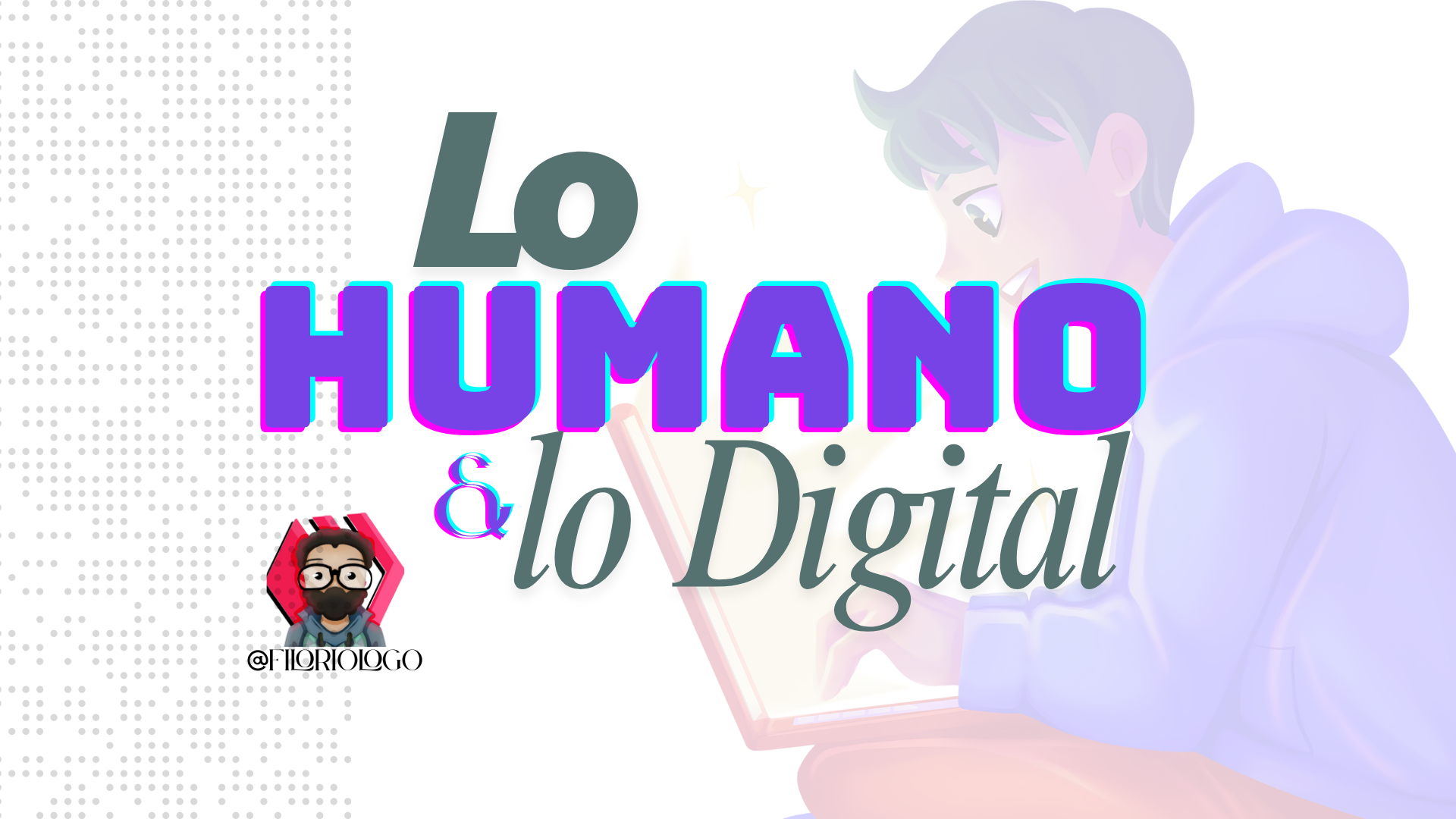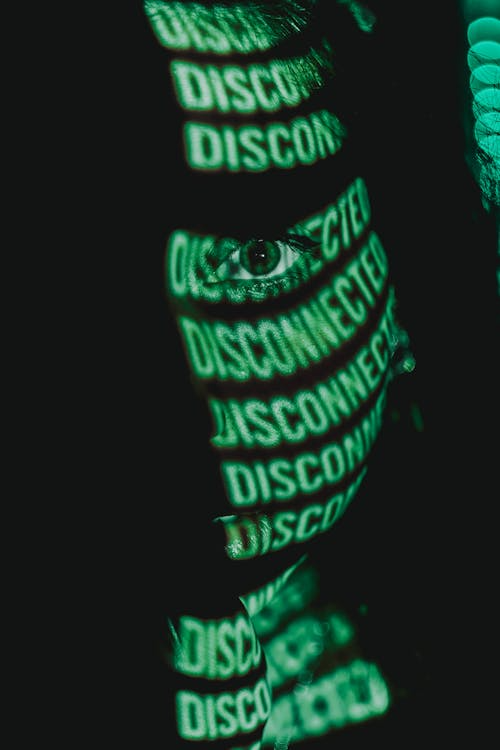Sobre la cuestión del ser humano es algo de lo que se ha debatido de sobreabundante manera y desde incontables perspectivas. Entre todas las cosmovisiones en torno al ser humano me quedo con un par, la antropológica y la filosófica, y claramente la fusión de estas (la antropología filosófica). Una de las asignaturas que más disfruté en mi primer año de filosofía, afortunadamente tuve el privilegio de tener una maravillosa docente (Dra. Carmen Alicia Di Pasquale) quien con meliflua voz persuadió a mi alma de andar por los derroteros de la pregunta siempre irresoluta.

Portada creada con CanvaPro
La pregunta por el ser del hombre (ser humano), epicentro de miradas y perspectivas una vez se ubica en medio de lo que nos convoca e invita a disertar en esta oportunidad. Pero antes de proseguir, me gustaría hacer una breve distinción, una cosa es lo humano en lo digital otra diferente es lo humano con lo digital. No me parece demasiado complejo de entender, creo que la distinción más allá de las preposiciones radica en el horizonte del ser en cada caso. En el primero, en el que intentaremos esbozar con más detenimiento lo humano se pregunta por su ser, se detiene frente al fenómeno de lo digital con una mirada que pretende develar precisamente eso que es. Lo segundo, simplemente evoca la relación de lo humano con el fenómeno sin mayor interés o necesidad, no se cuestiona nada.
Volviendo la mirada sobre aquello que nos convoca me hace pensar en el hecho que lo digital ya no es algo que deviene como algo que viene de fuera y me interpela de manera accidental, como quizá sí lo fue en el principio. Pero, su evolución lo ha conducido a abarcar casi toda esfera existente, incluso llegando a convertir dispositivos en extensión de nosotros mismo, una suerte de apéndice que nos permite estar conectados, independientemente del dispositivo, las extremidades superiores parecen no terminar en la punta de los dedos, sino que hay dispositivos que podamos interactuar con lo digital en tiempo real.
Por lo que sea que sea el humano, lo virtual se ha convertido en una especie de conciencia proyectada, dicho esto, creo que está más que respondida la pregunta inicial. Por supuesto que hoy por hoy, el ser que somos está poderosamente ligado a lo digital, está atravesado por esto al punto que creo que más que preguntarnos por el por qué, habría que preguntarnos por el cómo. Caso que me parece curioso, ya que el sempiterno por qué filosófico queda supeditado al cómo.
Lo digital, como virtualidad, es un nuevo entorno de proyección de lo humano. No es que lo digital nos haya cambiado, sino más bien que al parecer ha atado cabos que en tiempos pretéritos era algo complejo de realizar, ha creado un entorno que ha sido mercantilizado cosas que pensábamos no se podían monetizar como la atención, por solo mencionar un caso como ejemplo. Dejando únicamente a la mente y nuestra habilidad epistemológica fuera de la ecuación, aunque solo de momento. Es un asunto difícil de abordar, porque estaría entrando en el terrenos de las opiniones y de momento no quiero ser demasiado polémico, pero, me gustaría terminar esta breve disertación diciendo algo a tí mi estimado lector y genuinamente espero pueda hacerte reflexionar.
Eres lo que eres no porque lo hayas decidido críticamente, eres lo que eres como un producto mercantilizado de lo digital. Hoy, eres lo que el sistema quiere que seas. ¿Piensas que lo que piensas te pertenece? ¿El pensamiento está dejando de ser algo soberano?
ENGLISH VERSION
ENGLISH VERSION (click here!)
# Is what it means to be human affected by digital technology? The question of what it means to be human has been debated ad nauseam from countless perspectives. Among all the worldviews surrounding humanity, I am left with two: the anthropological and the philosophical, and clearly the fusion of these (philosophical anthropology). One of the subjects I enjoyed most in my first year of philosophy was, fortunately, taught by a wonderful teacher (Dr. Carmen Alicia Di Pasquale) who, with her mellifluous voice, persuaded my soul to walk the paths of the ever-unresolved question.  *[Fuente](https://www.pexels.com/es-es/foto/texto-5130296/)* The question of the nature of man (human beings), the epicenter of views and perspectives, once it is placed in the midst of what brings us together and invites us to discuss on this occasion. But before continuing, I would like to make a brief distinction: one thing is the human in the digital, another is the human with the digital. I don't think it's too complex to understand. I believe that the distinction, beyond the prepositions, lies in the horizon of being in each case. In the first case, in which we will try to outline in more detail, the human being questions its own being, pausing before the phenomenon of the digital with a gaze that seeks to reveal precisely what it is. The second simply evokes the relationship between the human and the phenomenon without further interest or need; nothing is questioned. Looking back at what brings us together makes me think about the fact that digital technology is no longer something that comes from outside and affects me accidentally, as it perhaps did in the beginning. However, its evolution has led it to encompass almost every existing sphere, even turning devices into extensions of ourselves, a kind of appendage that allows us to be connected, regardless of the device. Our upper limbs no longer seem to end at our fingertips; instead, there are devices that allow us to interact with the digital world in real time. Whatever humans are, the virtual has become a kind of projected consciousness. That said, I think the initial question has been more than answered. Of course, today, the beings we are are powerfully linked to the digital world, to the point that I believe that rather than asking ourselves why, we should ask ourselves how. This strikes me as curious, since the eternal philosophical question of why is subordinate to how. Digital technology, like virtuality, is a new environment for the projection of humanity. It is not that digital technology has changed us, but rather that it seems to have tied up loose ends that were complex to resolve in the past, creating an environment that has commercialized things we thought could not be monetized, such as attention, to mention just one example. Leaving only the mind and our epistemological ability out of the equation, at least for now. It is a difficult issue to address, because it would be entering the realm of opinion, and at the moment I do not want to be too controversial, but I would like to end this brief dissertation by saying something to you, my dear reader, and I genuinely hope it will make you reflect. You are what you are not because you have critically decided to be so, you are what you are as a commodified product of the digital world. Today, you are what the system wants you to be. Do you think that what you think belongs to you? Is thought ceasing to be something sovereign? *Translated with DeepL.com (free version)*
*** *Si deseas apoyar mi trabajo acá puedes enviar un tip* *If you wish to support my work here you can send a tip.* *** - Bitcoin *Lightning Network*: filoriologo@sats.v4v.app - Bitcoin: 1Sarz4FYPMDGmEUL8DsAQYHKZSVazAaFk - BINANCE ID: 4072493  | [X](https://x.com/FiloRiologo?t=KwqSCxo_stO89jFXp1QBoQ&s=09) | [Instagram](https://www.instagram.com/filoriologo?igsh=cW9nYm9jN3V4aGky) | [Medium](https://medium.com/@filoriologo) |[Telegram](t.me/filoriologo) | [LinkedIn](https://www.linkedin.com/in/cesar-díaz-885a0a183/) | [INLEO](https://inleo.io/profile/filoriologo/blog) |